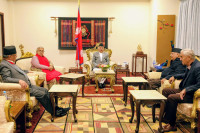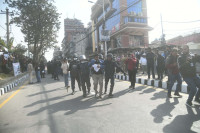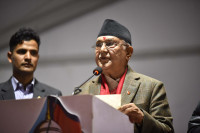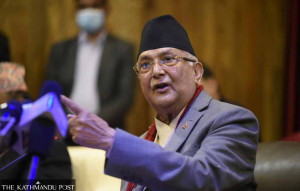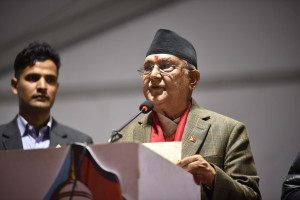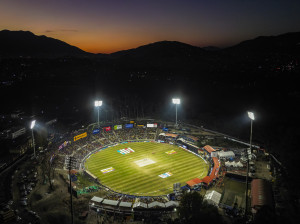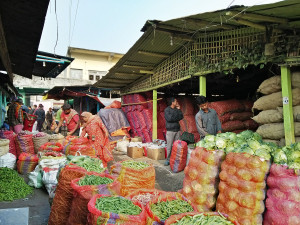Editorial
Boxed in Baluwatar
While Tarai burns, PM Oli has given very little impression that he’s serious to resolve the crisis
This has been a year of crisis compounded upon crisis. Only four months into the year a major earthquake struck, and since then the country has become mired into myriad calamities. And the political leadership has not succeeded in tackling these crises. It is clear that the most urgent issue at hand is dealing with Madhesi demands and the ongoing turmoil in the Tarai since the past three months. Only if this issue is addressed will it be possible to move on to other problems facing the nation. A negotiated solution will go a long way in defusing the Tarai unrest and lifting border blockade, which has evidently been assisted by New Delhi too. It will then be possible to work seriously on post-quake reconstruction. There will then be a conducive political environment of consensus for passing laws relating to the Reconstruction Authority. The government can then take the step towards acquiring funds from the donors—including India and China—that had been pledged during the reconstruction conference five months ago.
But the parties have been unable to agree on Madhesi demands. In fact, the government is hardly talking to the protesting groups lately. Relations between the government and the main opposition party the Nepali Congress have also deteriorated. The situation has become so bad that UCPN (Maoist) Chairman Pushpa Kamal Dahal recently had to ask PM Oli to call a meeting of all political forces. The Oli government still seems to be inclined to think that the problems facing the country can be resolved through the use of force, including the use of army. Needless to say, this line of thinking is completely misguided. What is needed is negotiation and flexibility.
The strain of the crisis has taken a major toll on the population as well. There is much suffering across the country. The crisis has polarised the population further. Sections of society believe that New Delhi’s position has further complicated the political dynamics on the ground. People on one extreme blame Delhi for all the ills while those on the other applaud every tactic, including violent ones, adopted by the agitating parties. Neither is helpful. The fact is Nepal does have a serious internal problem and it needs to resolve it. But it is also a fact that Delhi’s approach has led to needless hardships and ruined the national economy too. It is also a fact that anti-Indian sentiment has increased. Last week, a number of schools brought out school children to protest on the streets against the blockade. This is clearly a violation of the rights of the children but so are the violent attacks, for example, on people who have been found to be carrying oil or defying the border blockade. Then, yesterday, a Maoist faction led by Netra Bikram Chand ‘Biplab’ decided to impose a banda against the blockade, seemingly oblivious that this would lead to more hardship for the Nepali people while doing nothing to solve the current crises.
Clearly, 2015 will go down as one of the worst years in Nepal’s history. If things continue as they have so far, the months ahead and the next year will also be almost equally bad. To ensure that this does not happen, the government needs to immediately take steps to find ways to resolve the crisis in Madhes.




 6.12°C Kathmandu
6.12°C Kathmandu
